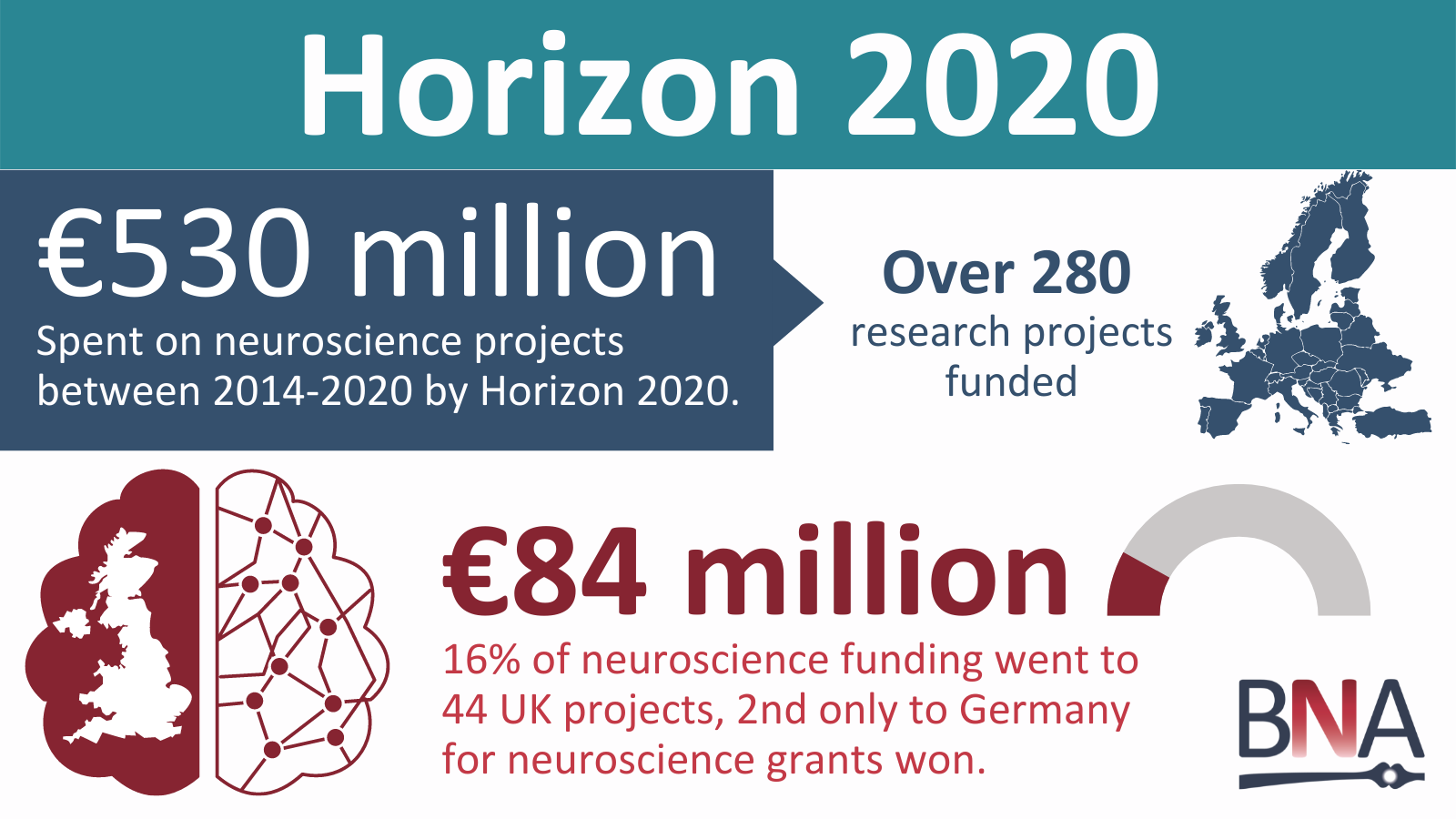BNA Annual General Meeting 2025
1st April 2025
7th Jul 2022
The British Neuroscience Association (BNA) has today joined with neuroscience societies across Europe calling for a rapid confirmation of UK membership to Horizon Europe, the world-leading research and innovation programme which provides funding and – crucially – the framework for neuroscientists to collaborate across the EU.
The open letter to the President of the European Commission, Dr Ursula von der Leyen, sends a united message highlighting concerns the European neuroscience community have over the current delay of UK association to Horizon Europe, and the need to confirm this urgently to help keep European neuroscience collaboration open.
When neuroscientists collaborate, neuroscience as a whole benefits. The UK played an important role as part of the previous funding programme, Horizon 2020, second only to Germany for neuroscience projects hosted. UK participation in Horizon Europe is essential to maintain an open and inclusive European Research Area and ensure that neuroscience collaboration continues.
We encourage our members and supporters to join the BNA in signing up to the Stick to Science campaign calling for science collaboration to be placed before politics.
The text of the letter is below. You can also view a pdf of the version sent today.
Dear President von der Leyen,
We are writing as representatives of the European neuroscience research community, representing over 21,000 neuroscientists from 44 neuroscience societies across 33 countries. We represent many of the leading neuroscience researchers across Europe, many of whom have benefited from close collaboration across borders through Horizon 2020. We write together to urge that the UK’s association to Horizon Europe be rapidly agreed.
Our greatest collective challenges cut across national borders. Neuroscience research is essential for fundamental understanding of our humanity, to prevent and treat disorders of the brain and nervous system. Neurological disorders are one of the leading causes of disability globally, while over 1 billion people live with mental health disorders. The complexity of the brain makes tackling these diseases very difficult, which is why continued global collaboration on neuroscience is absolutely critical.
Horizon Europe is a vital lever for global collaboration, forging alliances and partnerships that keep European research at the cutting-edge of discovery – and globally competitive. This is particularly true for neuroscience research, which benefited from at least €530m funding over 280 neuroscience projects under Horizon 2020. The UK has been a key partner in many of these collaborative projects, receiving funding for 44 projects (second only to Germany), and European neuroscience research has benefited from sharing expertise across borders.
On July 9th, the European neuroscience community will come together for the FENS 2022 Forum in Paris – highlighting the strong ties that exist between neuroscience societies across Europe and the enthusiasm of neuroscientists to remain connected with their colleagues across borders.
There has been considerable anxiety within the neuroscience community on how the UK’s departure from the EU could harm future research and collaborations. We are aware of seven UK-based neuroscientists successfully awarded ERC grants who have been affected by the delay to UK association to Horizon Europe being confirmed.
Keeping Horizon Europe open is in all our best interests. Shutting out long-standing partners such as the UK from Horizon Europe would compromise the advances that we hope to achieve from cross-border cooperation over the next decade in fields such as neuroscience.
There is still time for UK association to be resolved, but this is rapidly running out. We strongly urge you to support an open and inclusive European Research Area, and rapidly confirm UK association to Horizon Europe – an outcome that would be welcomed in neuroscience labs across Europe.
Yours sincerely,
Richard Henson, President of the British Neuroscience Association
Jean-Antoine Girault, President of the Federation of European Neuroscience Societies
Annie Andrieux, President of Société des Neurosciences
Igor Branchi, President of the European Brain and Behaviour Society
Paola Bovolenta, President of Sociedad Española de Neurociencia
Alban de Kerchove d’Exaerde, President of the Belgian Society for Neuroscience
Karen Doyle, President of Neuroscience Ireland
Andre Fischer, President of the European Molecular and Cellular Cognition Society
Judith Grisel, President of the International Behavioural and Neural Genetics Society
Johannes Hirrlinger, President of the European Society for Neurochemistry
Selma Kanazir, President of the Serbian Neuroscience Society
Gitte Moos Knudsen, President of ECNP
Steven Kushner, President of the Dutch Neurofederation
Klas Kullander, President of the Swedish Society for Neuroscience
Martin Lammens, President of EURO-CNS
Maryann Martone, Chair of the International Neuroinformatics Coordinating Facility
Mihai Moldovan, President of the National Neuroscience Society of Romania
Pétur Henry Petersen, President of Icelandic Society for Neuroscience
Elzbieta Pyza, President of the Polish Neuroscience Society
Christine Rose, President of the German Neuroscience Society
Yavin Shaham, President of the European Behavioural Pharmacology Society
Susan Wray, President of the Federation of European Physiological Societies
Marijan Klarica, President of the Croatian Society for Neuroscience (added 11 July)
Ioanna Sandvig, President of the Norwegian Neuroscience Society (added 11 July)
Bayram Yilmaz, President of the Neuroscience Society of Turkey (added 11 July)
Ana Cristina Rego, President of the Sociedade Portuguesa de Neurociências (added 21 July)
Csaba Attila Fekete, President of the Hungarian Neuroscience Society (added 21 July)
Isabella Sarto-Jackson, President of the Austrian Neuroscience Association (added 21 July)
Alessandro Vercelli, President of the Italian Society for Neuroscience (added 21 July)
Jirí Palecek, President of the Czech Neuroscience Society (added 22 July)
Boris Rogelj, President of the Slovenian Neuroscience Association (added 22 July)
Panagiotis Politis, President of the Hellenic Society for Neuroscience (added 22 July)
Vaghinak Sargsyan, President of the Armenian Neuroscience Society (added 22 July)
Osvaldas Ruksenas, President of the Lithuanian Neuroscience Association (added 26 July)
